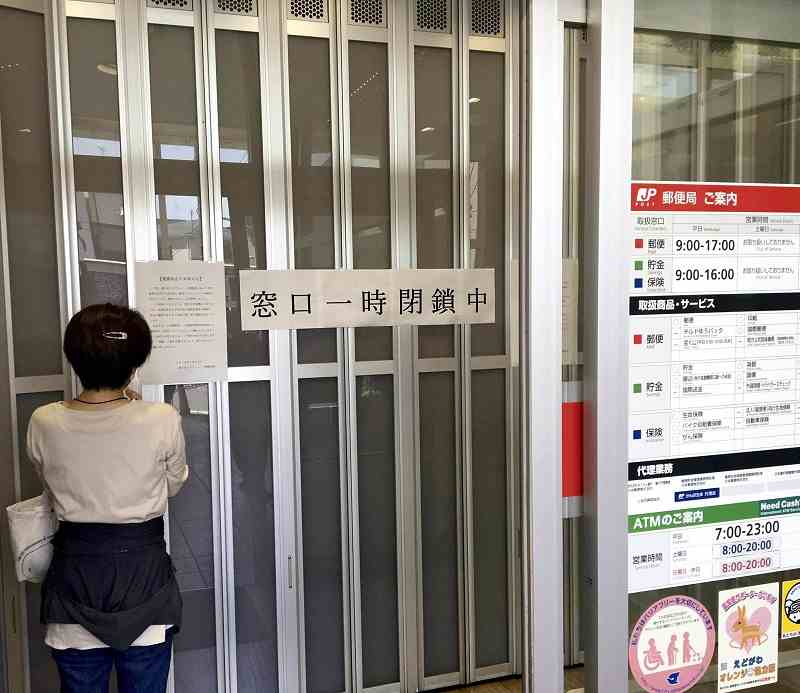Workers in short supply as 7th wave tightens grip

A woman reads a notice about the suspension over-the-counter services at a post office in Edogawa Ward, Tokyo, on Monday.
17:21 JST, August 4, 2022
From post offices temporarily closing to train and bus operators reducing their services, the seventh wave of novel coronavirus infections is having a growing impact on social and economic activities across Japan.
The government has implemented measures such as shortening the isolation period for people classified as close contacts, but companies and medical institutions are still being stretched to the limit by labor shortages as the nation grapples with record-high numbers of new coronavirus infections.
Suspended services
When a 62-year-old woman went to a post office in Edogawa Ward, Tokyo, on Monday, she was shocked to see a notice on the door stating that the branch had suspended over-the-counter services.
“I never imagined the pandemic would affect such services. I really need a revenue stamp today,” she said. “It’s inconvenient that the post office is closed, but given the current situation, I can’t blame anybody for this.”
Wiping the sweat from her brow, she headed off to find another branch.
According to Japan Post Holdings Co., a growing number of employees have caught the virus or had close contact with an infected person during the latest pandemic wave. As of 2 p.m. Wednesday, 203 post offices across Japan had suspended over-the-counter services, mainly small branches that were unable to find replacement workers.
A worker shortage also has battered fast food restaurants and coffee chain operators since July. McDonald’s Japan temporarily closed 78 of its restaurants, and Starbucks Coffee Japan shut the doors at 40 outlets.
Test kit shortage
Infections among drivers, crew members and other transport network employees have resulted in a flurry of cancellations or reduced services.
Odakyu Bus Co. has cut services on some routes in the Tokyo metropolitan area since mid-July, and Seibu Bus Co. followed suit in some areas Wednesday. Toei Bus cut services on eight routes from Thursday because 4% of its about 2,500 drivers were unable to go to work.
Railway operators are also feeling the seventh wave’s impact. Kyushu Railway Co. has suspended 120 limited express services.
On July 22, the government cut the isolation period for close contacts. People can stop self-isolating if they test negative on the second and third days, or on the fifth day without a test, but it seems the measure is having only a limited effect.
Odakyu Bus was initially unable to acquire test kits, so its employees were forced to stay in isolation for the full five days.
The company has since acquired 100 test kits. “It’s certainly not enough,” an Odakyu Bus representative told The Yomiuri Shimbun. “The government should take steps such as prioritizing the distribution of kits to essential workers who keep society functioning.”
Clusters hit record high
In the past week, a record-high 270 infection clusters were confirmed at medical institutions across Japan.
Medical personnel who are close contacts can work provided they meet certain conditions such as having no symptoms and testing negative each day before work, under special government measures. Despite this, many medical institutions still have barely enough staff.
At Chiba University Hospital, 4% of the facility’s total workforce of about 2,800 employees were self-isolating at home Wednesday. The hospital currently is restricting the number of regular patients admitted to the hospital to 80% of regular levels.





